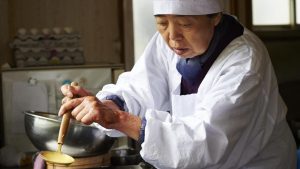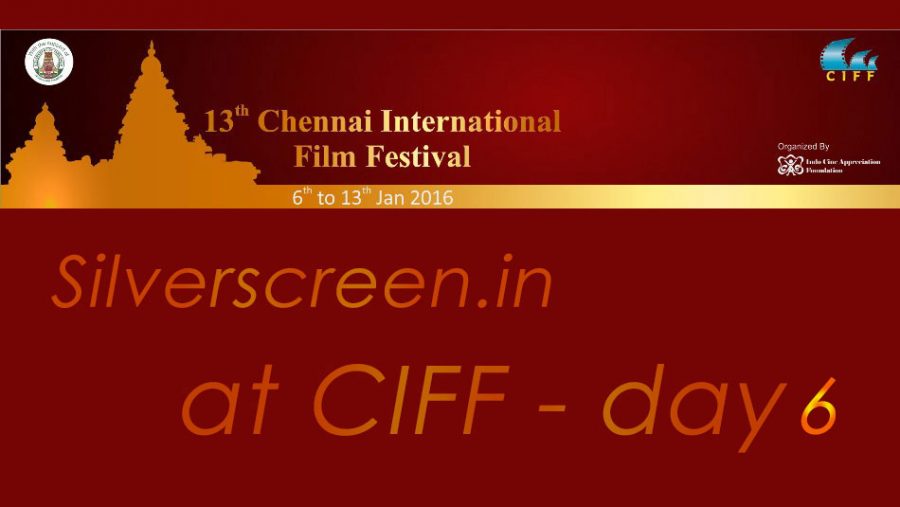The 13th edition of the Chennai International Film Festival (CIFF) 2016 is in full swing with 7 venues in Chennai, including the Woodlands theatre. With 800 delegates attending, 183 films will be screened, from over 50 countries. The 8-day festival runs from 6th to 13th January. Inaugurated by Nadigar Sangam office bearers, and likely to be closed by Rajinikanth, the festival brings together critically acclaimed international and Indian films, with a special focus on Tamil films.
It’s 11 am and Day 6 of the CIFF. Woodlands theatre looks like a quiet and disciplined convent school. Barring a few loiterers around the festival office, the compound is deserted. I can’t help but think of the crowd and cacophony at the International Film Festival in Kerala. By the time the first film of the day, Pioneer Heroes, is screened, the cinema hall is packed. But the audience neither sneers nor boos during the screening. Clapping is reserved for the end. It’s the perfect ambience for serious film watching.
*****
Pioneer Heroes (2015)

3_pioneer-heroes_1
But after a while, the film’s obsession with the characters’ past infuses the story with a certain dullness. It stops saying anything new. But then there Ruslan Gerasimenkov’s mesmerising cinematography. A dreamy and hazy shot of a young Katya walking up to the deserted Hall Of Fame is beautiful. There are marvellous close-ups – of Sergone trying to hide his distress by working long-hours, ignoring his dreams; of Olga breaking down, unable to handle the pressures of urban life.
*****
Short Skin (2014)
Short Skin is a light-hearted comedy about a teenager’s ‘penis problem’. Directed by debutant director Duccio Chiarini, Short Skin is about Edo, a boy suffering from Phimosis, a disease that tightens the foreskin. He’s unable to share his distress with anyone, except his slow-thinking best friend.
It gets worse for Edo. His parents are heading towards a divorce, which makes him realise that his sexual problems aren’t any more awkward than his parents’ relationship issues. The film’s casual, straightforward, and sugar-coated take on the adolescent’s hormonal issues is a remarkable feat. The awkward moments in Edo’s life – when he goes to a doctor, discusses the issue with his friends, and eventually, when he opens up to his parents – are seamless and organic. Best of all, the camera doesn’t drool over nude female bodies, and the film doesn’t laugh at the skinny teenager’s inability to masturbate.
*****
An (2015)

an
Set around a crêperie in Tokoy, which sells Doroyaki (pancakes stuffed with An) and is run by a gloomy man, the movie imparts its life lessons through the perspective of a frail old woman named Tokue. She is 76, and can cook the best An in the world. Tokue looks at cherry blossoms like they’re pure magic, and she cooks An with motherly affection. The sanatorium where Tokue lives is reminiscent of Norwegian Wood, but the gloom and insanity is replaced with positivity and love. The disabled people at the palliative centre laugh with abandon. It’s the characters living in the outside world who are insensitive, lonely, or depressed.
An lacks a uniqueness that would distinguish it from other Japanese philosophical dramas, but it is a poignant watch and a visual marvel.
*****
Embrace Of The Serpent (2015)
Probably the best film of the day, Ciro Guerra’s Embrace of The Serpent is a movie monochrome about the wilderness of the Amazon forests. It is violent and heart-breaking, scary and psychedelic. And, strangely enough, it is hopeful.
The film is inspired by the diaries of two scientists (the German, Theodor Koch-Grunberg and the American, Richard Evans Schultes), who travelled to the Amazon in 1909 and 1940 respectively, looking for the sacred Yakruna plant. The film describes the destruction of the indigenous vegetation and tribal population caused by white men who arrived in the Amazon forests, looking for rubber, quinine, and to preach Christianity. As a truthful account of how a section of humanity vanished from the face of Earth, while others prospered, the film is a compulsive watch. It also echoes the famous Chief Seattle speech in 1854.
*****
Post-Screening Notes:
Recommended
I look around as I exit the hall after the screening of Short Skin, and notice that something isn’t right. I can’t spot any women, in a sea of men. Finally, I notice a lone woman in the crowd. I walk up to her and say hello. She’s a retired customs official, who had been living in Kolkata till recently. She says, “I am 60, ma. I have eye problems, so I watch very few films.” She lives by herself in Chennai. She smiles at me, “I don’t have a mobile phone or an email address. I’m just beginning to discover modern day life at this stage of life.” Very few women, she echoes my feelings, “I feel more women should come out of their houses and attend festivals like this. Not just college going girls, but older women – house wives, retired ones, grannies.”
*****



